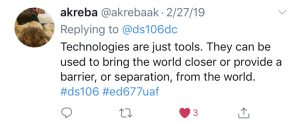Leads in a way
Usually in regular storytelling without media, our imagination takes over. We picture and translate words into our very own characters and locations. So we might even misinterpret the surrounding the author was envisioning. With media, the author can depict exactly where and what they want the reader to see. Which can be a good thing, but it can also be a bad thing. That is why I prefer to read a book than watch a movie. For example, the book versus the movie of “The Help”. The book did something I had never seen done before. Each chapter was from a different character perspective, which would be difficult to convey in a movie. The movie was centered mainly around the life of Skeeter. So to me, the book was much more powerful, as the different perspectives led my imagination further than visual media did. So from my experience books over movies because movies left me somewhat discouraged from what I had imagined.
Encourage vs. Discourage
Erika Horn was discouraged by the outcomes in the Haiti digital story. “I really enjoyed the ability to interact with the material, but I don’t think that all stories would serve well in this format. I prefer traditional storytelling despite enjoying these.’ Kat suggested they have some way for the reader to ‘improve things’ to not be so ‘hopeless and fatalistic’. But do all stories really have a happy ending? Maybe this was what the author was trying to get at. Not all stories have happy endings. However, Kat brings a good point of “if every decision was a bad decision, how could things be better today?’ If the author could have given some glipse of hope in the interaction process, maybe some readers could have connected more with it.
Could some of the readers have enjoyed the story more if it was just straight cut, no options and no interactions? Maybe some stories would fathom better that way, but others not. Is the point of storytelling to have some lesson, an answer to a question? If it doesn’t have a happy ending or conclusion is it still a story?
I discussed these questions with my husband since I had a hard time answering them. He made a good point that all the crime shows we watch have many stories without a conclusion or a happy ending. It doesn’t make the narration less of a story.
Chris Fliss stated “before the article, I realized that the devastation was horrific. After reading the article, I realized how much worse it really is’. So could it be the story format or could it just be dependent on who is reading it? I think the story format really helped experience how difficult it was to make decisions and how those decisions affect the current state of the country. But it also has to do with how much background the reader knows beforehand as well.
Moreover, all of us didn’t like the football story. Why could that be? Chris Fliss suggests “it lacked a hook’ and Kat stated it was “lots of bun and no weenie’. A lot of information presented, yet no connection with any of us as readers. I look back at the Seven Steps of Storytelling and I think it goes back to if you are asking a question, but keep going or keep asking abstract questions without giving any hint to the reader, you could just loose them. That is why the author from Seven Stepes of Storytelling said if you state a question, inform the reader, then remind about the question to not loose them.
Teach
Encouraging digital storytelling can teach students what creative forms of expression there are out there. As we become a more technology literate society, digital storytelling is a new art form where students who have had a hard time concentrating in reading, can stay focused more. Also, digital storytelling allows for new ways to connect between students for faster feedback and reflection processes.
So does digital storytelling add or take away from traditional storytelling?
According to our conversations on Slack it varies based on the story. i think the following tweet says it all.

I love how you curated and connected comments from classmates in Slack. I think this middle section of your post is the strongest, as you creatively draw on voices of others and add your own at the end, “I think it goes back to if you are asking a question”. You ask a series of questions here that I want to hear your answers to! “Is the point of storytelling to have some lesson, an answer to a question?” What do you think?? In the first section of the post, you make some interesting claims, but they’re not anchored in specifics — or what some might call “evidence.” For me, and in a storytelling class, I am not necessarily looking for a quote from a publication/authority as evidence. A story would be enough (i.e. have you had this experience of preferring reading to movies? When? Can you say more about it?).
Thank you for your feedback Professor Kendell! I didn’t realize how confusing it could be to write all the questions I think of without writing my thoughts on the replies.
I switched up the beginning so it doesn’t sound like everybody has the same mindset as me jeje. Books > movies all day tho. Hope the review makes it flow better.